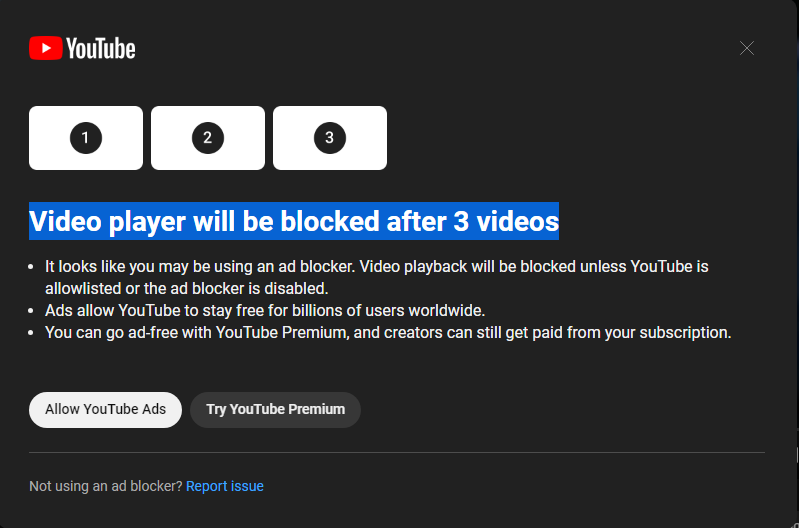
YouTube announced yesterday that third-party applications that block ads while watching YouTube videos violates its Terms of Service (ToS), and it will soon start taking action against the apps.
Google exposes numerous APIs allowing developers to integrate YouTube into their applications, showing videos or retrieving data about videos hosted on the platform.
However, some developers have created apps for Android and iOS with millions of users that are promoted as a way to watch YouTube videos without seeing any advertisements in videos.
Google now says that any apps using YouTube APIs that block advertisements may soon be blocked from its developer APIs.
The video platform also warns that users of these apps may now suffer from extended buffering or get the error "The following content is not available on this app" when trying to load a video.
YouTube says this is to protect creators, as disabling ads affects the revenue they earn.
"We want to emphasize that our terms don't allow third-party apps to turn off ads because that prevents the creator from being rewarded for viewership, and Ads on YouTube help support creators and let billions of people around the world use the streaming service," says the YouTube announcement.
For those who want to enjoy YouTube without ads, the company suggests subscribing to Premium, which costs between $13.99 and $18.99, depending on the user's platform.
YouTube has been experimenting with various methods to crack down on ad blocking since last year, including prompting users to disable their ad blockers to watch videos and restricting users of ad blockers to just three videos.

In January this year, Adblock and Adblock Plus users reported performance issues on YouTube, which many rushed to interpret as Google ramping up aggressive measures against ad blocking.
It was later confirmed that the video buffering problems were caused by a bug in the extension's engine, severely impacting performance on pages that dynamically load content.
BleepingComputer has contacted Google to clarify what types of apps violate their API terms of service and will update this post as we know more.


Comments
0Willy - 1 week ago
You hate repetitious advertising that misrepresent product. We're going to force you to watch them, like it or not.
b1k3rdude - 1 week ago
Cat and Mouse, Wack-a-mole, Seen it all before. Its like they aren't aware that other web browsers and platforms exist, that they have zero control over...All this will do is result developers finding other-ways to circumvent their banal ads.
I don't for a second believe Google give a flying f**k about the creators, Its greed pure and simple. If YT Red, or YT Premium or what ever the hell they rename it to next, had a single fair annual price, I would probably have it. But when its more than what Netflix charge, they can f**k right off. Its almost like they think YT is in the same leage as Netflix.
Here is an idea, maybe have a 1080p YT-only plan (no music, or any of the other useless crap we don't need/want) for £35 per year.... But I digress, Netflix and prime are also on the greed train with basic teirs being infected with Ads.
Or maybe they will just keep going down the path they are on and then at some specific point, when the views have dropped far enough, Alphabet will just do what they have always done and shutter yet another service.
tomthegeek - 1 week ago
Their ads are a waste of time, irrelevant, aggravating and useless, on top of being unreasonably long, and unreasonably numerous. They can kiss my ass, I will always utilize adblockers.
Licht92 - 1 week ago
Who cares about the YT app on Android:?
Kiwi Browser and Firefox with uBlock Origin all the way ....
Sinikal - 1 week ago
Even if you pay for premium you have to deal with the in video ads that they ALL seem to have now days. I'm a premium subscriber and always have to skip through the in video advertisements, if I had to watch ads on top of those I wouldn't use YouTube.
b1k3rdude - 1 week ago
I assume you referring to the sponsored sections in videos, I don't mind these, but tend to skip half of them, because either they are US focused ads or Ive seen the same sponsor for the nth time.
DrkKnight - 1 week ago
My opinion is that if you are paying for a service then you should have the option of using that service completely ad free. If you are paying for YouTube and still receiving ads , you are being taken advantage of.
If I was paying for YouTube, but I don't, I don't use it enough to even care about it , but if I was and was still receiving ads I would dump it immediately , which is my suggestion to all of you that are paying for their service.
There are far better streaming services out there that you can pay for and receive no ads at all
YouTube does this because .... they can, their user base is so big they can pretty much do whatever the hell they like whether you like it or not. The masses still follow and gobble it up, so to complain about it is fruitless, close the account and move on and let the other morons be taken advantage of, simple as that.
Now Free users? expect ads, if you don't want em, move on.
NoneRain - 1 week ago
Just patch the official app...
tech_engineer - 6 days ago
This is just pure greed from Google, their yearly ad profit Is in billions and they are worried about those few million installs of ad free apps?
0xDYL4N - 6 days ago
I wonder what the actual percentage of users is who use Adblocking extensions/apps is? The people they are targeting with these changes are likely people who wouldn't purchase YT Premium regardless, and they would sooner just avoid using YT.
Very few people in my circle use Adblock (or other) on Youtube, while most just pay for Premium.
Mahhn - 6 days ago
Goog, the new aol. watch it fade away as they desperately try to squeeze every penny out of it's victims. I will never give any goog service as much as a penny.
Mahhn - 6 days ago
why don't people like google adds- ohh maybe this is one: https://thehackernews.com/2024/04/malicious-google-ads-pushing-fake-ip.html
Mr.Tom - 1 day ago
The more people Google block who use adblockers means less views for their users. Content creators should be somewhat upset over this. No views, no subscribers.